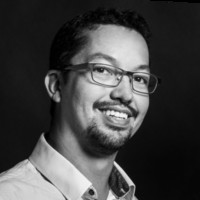
CEO of Ryax Technologies, Andry Razafinjatovo is an engineer and alumni of HEC business school. He first started his career in the High Performance computing field as an architect and R&D team leader. He then cofounded Ryax Technologies with two of his partners, Yiannis Georgiou (CTO) and David Glesser (CPO), in November 2017. The company is developing a platform allowing the production of data science algorithms on hybrid On-premise, Edge, Cloud infrastructures.
A shared perspective
The AQMO project represents a typical case of data exploitation service that we will most likely encounter in tomorrow’s computing. This project combines environmental goals, analysis of data from sensors and efficient use of Edge, Cloud and HPC infrastructures (supercomputers), and therefore it particularly highlights additional constraints linked to the data science production on complex computing infrastructures.
In AQMO, we encounter numerous challenges the Ryax platform allows to overcome:
- unified management of a hybrid infrastructure (securing, data flow, connection intermittency, monitoring)
- management of applications lifecycle (deployment, execution, update)
- user authentication
This project is in direct line with the vision Ryax Technologies promotes since its creation (and which seems to be increasingly shared by market players) : because of performance, confidentiality and costs, the centralisation of services in the Cloud is generally inefficient, and thus not recommended.
Ryax Technologies to AQMO
The Ryax platform resulted from both the experience of its co-founders and an analysis of the evolution of the data science market: today, numerous stakeholders (companies, institutions, etc.) increasingly invest in projects that analyse their data to capitalize on it. For many of these initiatives, it is now time to go beyond the stage of Proof of Concept and effectively use this data value to build on the human and material investments. This is the only way to obtain a good return on investment and to create a real competitive advantage.
Following their fundraising, the Ryax platform is now marketed and a particular focus is placed on industry, transports, energy and smart city.
RYAX solution
The Ryax solution plays several roles in the global architecture of AQMO as it allows the development of data analysis chains and the orchestration of these workflows on the hybrid infrastructure on which AQMO is deployed.
More precisely, AQMO is composed of a hybrid infrastructure dividing the computing resources at Edge, Fog and HPC/Cloud levels. First, air quality data is collected by sensors on different buses and drones (Edge) circulating in the city. The data is gathered in centralised servers (Fog) before being send for computing to HPC centres or Cloud. The goal is then to extract previsions and relevant information. For each level, data must be forwarded and aggregated in accordance to the connection network quality. When the computational power is available (Edge-Fog-HPC/cloud), the data processing can take place to perform various manipulations.
Ryax provides the resources to users to develop and deploy their data analysis in a transparent way regardless of the underlying infrastructure’s complexity. Such solution relies on services integration from one of our partners UCit for the “HPC as a Service” functionalities and the sensor platform and Edge stage developments offered by the University of Rennes 1.
AQMO as an innovation in data collection and processing
AQMO is a typical example of what could be real-time data processing services in a near future (drone service, autonomous car, smart cities, energy-production sources in low-connected environments, etc.). Through this example, AQMO offers an appropriate analysis of the issues and of the necessary steps to exploit these services.
Beyond AQMO
Ryax Technologies is involved in the initiative of the French MIAI Grenoble Alpes (Multidisciplinary Institute in Artificial Intelligence) around the Edge and AI issues. Ryax is particularly involved in the “distributed intelligence” line of work, an area in which our team is one of the main contributors.
Furthermore, we are currently exploring data analysis techniques based on supercomputers for precision agriculture as a part of the H2020 project Cybele. The technical, strategical or business synergies of these two projects with AQMO are especially relevant.

